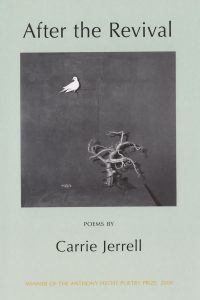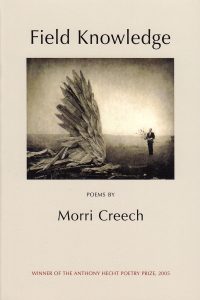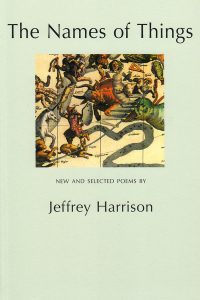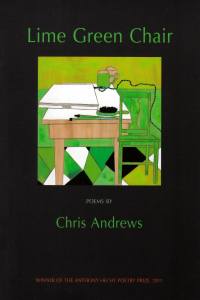Advent
£9.00
Introduction by Richard WilburAdvent is American poet Daniel Rifenburgh’s long-awaited first collection of poems. His work has previously appeared in leading U.S. journals, including The New Criterion, The Paris Review, The New Republic, Poetry East, Shenandoah and Western Humanities Review. In 1996 he received the prestigious Robert H. Winner Award from The Poetry Society of America, given “to honor an American poet in mid-life who has not previously been recognized.” Technically accomplished, but only occasionally formal, Rifenburgh is essentially, as Richard Wilbur notes in his introduction, “a poet of strong, forthright feelings, both dark and light”. His debut volume is certain, as Lucien Stryk has said, “to please all who care for the art.”
Texas Institute of Letters's Natalie Ornish Award for First Book of Poetry for 2002
Out of stock
Advent
"Poetry has always been said to speak a charged, heightened language … Daniel Rifenburgh’s words seem to me to bear a considerable charge … The language of Advent often has the force of spare accuracy: it can also stun the reader with a brilliant, slow-fuse image. What governs the movement of the poems is a genius for the speaking voice … Such poetry is rich because of its many articulate selves, and the way its variety of voices makes for a striking texture of dictions …" – Richard Wilbur (from the Introduction)
"Of very few books, let alone first books, does one wish to proclaim, ‘This is it!’ Advent is that rare exception, a collection certain to please all who care for the art. Daniel Rifenburgh has all one could possibly hope for in a new poet: ambition, wisdom and breathtaking skill." – Lucien Stryk
"The poems are terrific: so fluent, so smart, and brimming with charm. Rifenburgh is my candidate for discovery of the year. He cannot be compared to X or Y. He is Z all by himself." – Donald Justice
"These poems are startling in their vividness, skill, their originality and solidity. I find that lines and images resonate long after they have served the purposes of their local contexts. Mr Rifenburgh’s work deserves wider notice, particularly when so much of scant merit is greeted with acclaim." – Anthony Hecht
Reviews of Advent
London Magazine, April-May 2004
"Born in New York State, [Rifenburgh] served in the U.S Army during the Vietnam War and later worked as a newspaper reporter, travelling throughout Latin America. The Spanish-American influence is strong in his poetry, and he owes a particular debt to Cesar Vallejo. He teaches in Houston, where, before he won a prize for this first collection, he also drove a taxi… Rifenburgh is enjoyable because he ranges at large over many subjects, testing, exploring, reporting, celebrating; he has many moods … The work bears evidence of an ‘at-easeness’ with English and European literary traditions … For example, [he] devotes a poem called ‘Lycidas’ to the memory of a deceased brother, mixing an echo of Milton’s exalted syntax with contemporary slang to surprisingly good effect. Poems about Hawthorne and Melville, Villon, Shelley and Keats, rub shoulders with ironic evocations of the Sixties (see ‘LSD & All’), and wry, compassionate reflections on everyday life in South America.
In the Plaza San Martin in downtown Lima
A shoe-shine man snags the newly-arrived tourists
Trickling out of the splendid Hotel Bolivar.
At the end he hits them up for five bucks
In Peruvian notes, milking their confusion, but
Gives a great shine, spitting on their toes,
Slapping their feet like crazy.
Something of Elizabeth Bishop’s mixture of concern and amusement sweetens the brusqueness of Rifenburgh’s ‘Andean Music’. You could call its tone respectful of the unrespectable. You share a grim laugh with the poet as his plane takes off from Peru where ‘The only lights in Lima/ Come from the headlights of taxis’ because ‘The guerrillas have entered the city/And blown the electric grid.’ The airport officials are officious, dishonest, yet curiously generous.
They examine your passport,
Your luggage. You are a tourist;
You may go. Adios! Regressa!
Here’s a last shot of pisco, gratis.
Vuelve, Senor, otra vez
A nuestra Peru!
Yet, for all his ironic witticisms, Rifenbergh is, au fond, a profoundly spiritual poet, committed, like Hecht and Wilbur, to declaring his seriousness. The title poem, ‘Advent’, at the end of his collection, confirms an allegiance to Biblical phraseology and the Christian story that might steer a contemporary English poet into bathos. The American somehow gets away with it – I’m not quite sure why. Perhaps because the poem begins with such an exact evocation of a New England fall:
Rain continuous, all day
The drumming on sere leaves
That score the ground, curling
Upon nothing. They all fell, it seemed,
In a day, a day of wind without rain,
A blue norther, high pressure and
Crisp air. . .
None of this prepares us for the poem’s sermon-like conclusion.
We defeat the world through surrogates, and but briefly,
While placid beasts feed in drizzling pastures,
Building strength for the flight into Egypt,
Yet the son must be born in us, says the Father,
Or wither, when new oil floods the ventricles
And we become, however briefly, His surrogates
Or betrayers.
And for this, in Winter’s dead zero,
We must sing, sing Hallelujah.
– Anne Stevenson
Acumen, May 2002
"The second Waywiser book, Advent … presents the work of another American, Daniel Rifenburgh. The volume, a first collection, includes an Introduction by Richard Wilbur who rightly praises Rifenburgh’s work for ‘the way its variety makes for a striking texture of dictions’ and notes how ‘what governs the movement of his poems is a genius for the speaking voice – its keys, rhythms, and modulations, its dialects and echoes’. Rifenburgh writes vividly and forcefully on a wide range of subjects. Andean Music’ is a fascinating sequence of eight poems, colourful and intelligent. ‘Lycidas’ is a moving elegy on the poet’s brother; ‘Donald Justice before a Soft-Drink Vending Machine’ is gently humorous. Rifenburgh’s range is considerable, his technical control impressively assured, without ever being pedantic." – Glyn Pursglove
Houston Chronicle, December 2002
"Rifenburgh is a varied poet … [H]e has his literary side, with poems on Melville, Hawthorne, Keats, as well as poems after Rilke, Villon and the late American poet Henri Coulette. But some of his best work is from personal experience: poems on the death of his brother; on his uncle with a birth defect; on a broken marriage; on substance abuse in the 60s; even on selling used cars. When he writes in forms, he handles them superbly, including a setina (‘My Father’s Will’) and two villanelles (‘Written Words, Like Paintings’ and ‘Voice’." – Robert Phillips
In Shelley’s last, unfinished poem,
In Shelley’s great poem which is without closure
Because the poor poet drowned in water,
in Shelley’s great “The Triumph of Life,”
The last word of which is “of”
And the whole thing stops right there
While Shelley goes out to take in a boat ride
(Talk about your Lethe and Nepenthe!),
We meet, according to Harold Bloom
And Lionel Trilling, “Rousseau,
Prophet of nature, serving
As a surrogate for Wordsworth, entering
The poem as Virgil, the guide to Shelley’s Dante,”
And all of this is related to you by Rifenburgh.
It’s much easier, and sometimes as rewarding,
To study the bloodlines of flat-track thoroughbreds,
Such as: Raise A Bid got out of Botcha
Botcha’s Bid, or, This
Is Enough from On To Glory
Gave This Is Glory, especially if he won,
But Life always wins. It’s got
By Spirit out of Some Kinda Shit
And the odds are a zillion to one
(Or, is it one to a zillion, I forget)
That Life is going to win,
Going to suck you in, and Something Spritely
Is the racing name of that foal.
How can you resist her?
Who said you should?
Shelley did;
Laid his pen aside for an hour
And died, gasping water for air, air
And Life.
I sat in my car outside the track
And counted my losses.
Life lay down with death beside me
And they had the nerve
To fornicate in front of me.
I was thinking how Mar Best gave
Mon Go Fast by Mongo
And mon do go fast
But the colt, he finish last
And my money was wasted
Fast as life, fast as that,
Fast as was the track
Where the fleet hooves
Tossed up the turf;
The little clods of this our earth,
The quick, high flinging and falling of
The Waywiser Press
Postlude for a Broken Marriage
The end of it all
Is come and gone.
The curtain fell an hour ago.
Already scenery and scaffolding
Mumble in the wings like old thunder
Played out above the low hills of Louisville.
In the darkened hall,
Beneath rows of empty seats, along
Canted aisles, what strange eyes
The mice carry as they scurry over
The dropped playbills.
Out on the sidewalk, someone has stolen the town.
It is New York, Mexico City, Lima.
Across the street is a cafe,
Still open at this hour.
A woman sits there, nibbling pastry.
Farther down the street, beyond a traffic circle,
The distant glow of other marquee lights
And dim figures, lately
Ushered forth, standing under them,
Looking left and right and before.
The Waywiser Press
Excerpts
Turf Tract
In Shelley's last, unfinished poem,
In Shelley's great poem which is without closure
Because the poor poet drowned in water,
in Shelley's great "The Triumph of Life,"
The last word of which is "of"
And the whole thing stops right there
While Shelley goes out to take in a boat ride
(Talk about your Lethe and Nepenthe!),
We meet, according to Harold Bloom
And Lionel Trilling, "Rousseau,
Prophet of nature, serving
As a surrogate for Wordsworth, entering
The poem as Virgil, the guide to Shelley's Dante,"
And all of this is related to you by Rifenburgh.
It's much easier, and sometimes as rewarding,
To study the bloodlines of flat-track thoroughbreds,
Such as: Raise A Bid got out of Botcha
Botcha's Bid, or, This
Is Enough from On To Glory
Gave This Is Glory, especially if he won,
But Life always wins. It's got
By Spirit out of Some Kinda Shit
And the odds are a zillion to one
(Or, is it one to a zillion, I forget)
That Life is going to win,
Going to suck you in, and Something Spritely
Is the racing name of that foal.
How can you resist her?
Who said you should?
Shelley did;
Laid his pen aside for an hour
And died, gasping water for air, air
And Life.
I sat in my car outside the track
And counted my losses.
Life lay down with death beside me
And they had the nerve
To fornicate in front of me.
I was thinking how Mar Best gave
Mon Go Fast by Mongo
And mon do go fast
But the colt, he finish last
And my money was wasted
Fast as life, fast as that,
Fast as was the track
Where the fleet hooves
Tossed up the turf;
The little clods of this our earth,
The quick, high flinging and falling of
The Waywiser Press
Postlude for a Broken Marriage
The end of it all
Is come and gone.
The curtain fell an hour ago.
Already scenery and scaffolding
Mumble in the wings like old thunder
Played out above the low hills of Louisville.
In the darkened hall,
Beneath rows of empty seats, along
Canted aisles, what strange eyes
The mice carry as they scurry over
The dropped playbills.
Out on the sidewalk, someone has stolen the town.
It is New York, Mexico City, Lima.
Across the street is a cafe,
Still open at this hour.
A woman sits there, nibbling pastry.
Farther down the street, beyond a traffic circle,
The distant glow of other marquee lights
And dim figures, lately
Ushered forth, standing under them,
Looking left and right and before.
The Waywiser Press





